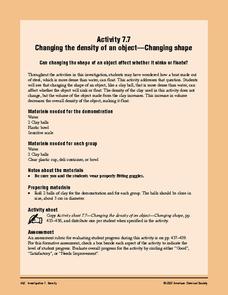Curated OER
Elements, Compounds, and Mixtures
In this matter worksheet, students review the three forms of matter by reading a poem and completing 1 matching and 5 short answer questions.
Curated OER
Chemical Solutions
For this chemical solutions worksheet, Students determine the significance of the critical point in a phase diagram and rank solutions from weakest to strongest solute-solvent interaction. This worksheet has 4 problems to solve.
Nuffield Foundation
Going up in Smoke
Don't let all your hard work go up in smoke. Pupils conduct an experiment to see the harmful effects of cigarette smoke. They observe how smoke changes the color of white wool and an indicator solution.
University of Georgia
Antacid and Uncle Heartburn
Household materials can be used for more than cleaning! In this collaborative experiment, emerging chemists use products such as vinegar and liquid antacid to explore chemical reactions that commonly occur in the human body.
Curated OER
Indicator Sponge A Discrepant Event Demonstration
Learners explore the use of acid and base pH indicators. The teacher saturates an indicator sponge with congo red solution. Afterwards, the sponge is placed in a blue base solution. Students observe that the blue sponge actually turns...
Curated OER
Climate Change: Is there a Controversy
Students explore climate changes. For this climate changes lesson, students research what causes changes. Students search the Internet, summarize reports they find and create a poster with the information.
Curated OER
Climate Change
Students discuss problems associated with a world climate change. They examine how animals would be affected if the world heated up.
Curated OER
WS 10.2 Chemical Bonding in Alkanes
In this bonding instructional activity, students write the chemical formula, the name of the alkane, the structural formula and the condensed formula given the number of carbon atoms in each alkane.
Curated OER
Chemical Equilibrium
In this chemical equilibrium worksheet, students review hydration, dissociation, and colligative properties. Students also review Le Chatelier's principle. This worksheet has 15 short answer questions and 12 problems to solve.
American Chemical Society
Changing the Density of an Object - Changing Shape
Continuing with the concept of volume and its effect on density, learners now work with a piece of clay to see if they can get it to float in water. This is a memorable end to a seven-part investigation of density. Make sure to check out...
American Chemical Society
Changing the Density of a Liquid - Adding Salt
Fourth in a set of several little lessons on density, this one compares the density of fresh and salt water. First by demonstration, and then by a hands-on activity, learners find that adding salt increases the density, as is evidenced...
Mascil Project
Molecular Gastronomy - Science in the Kitchen
Some say cooking is an art—and a science! Scholars scope out the savory subject of molecular gastronomy with a series of related activities. The teacher's guide contains printable worksheets and helpful tips for implementing the...
Curated OER
Breathing Victory
Students know that participation in sports requires energy. They comprehend that we get energy form the foods that we eat and the air thta we breathe. Converting food and air into usable energy is defined as celluar respiration. Students...
Chemistry Collective
Virtual Lab: Cobalt Chloride and Le Chatelier’s Principle
Colorful cobalt complexes make a great way to learn about Le Chatelier! Eager chemists explore equilibrium through a virtual lab. Individuals use solutions with two different concentrations and observe the color changes that indicate...
Curated OER
Acids and Alkalis
This PowerPoint progresses slide-by-slide through all the facts you would want to deliver about acids, alkalis, salts, and the related lab tests. Each slide has one or two facts about a physical or chemical property or behavior. The...
Curated OER
Solubility and Chemical Changes in Groundwater
Students test pH of water before and after it travels through different substrates (igneous pebbles and limestone) to detemine how soluble materials can affect groundwater. They answer questions such as: What happended to the pH of the...
Curated OER
Acid Rain Environment Pollution
Students combine different materials to create chemical reactions. In this chemical reaction lesson plan, students will combine different materials to create chemical reactions and define these results as acids or bases. They will also...
Curated OER
It's Alive! Using Microorganisms in Cooking
Students create a KWL chart about food. In this chemistry lesson, students differentiate physical and chemical changes. They explain how microorganisms are used in food preparation.
Curated OER
Endothermic or Exothermic Reactions
In this chemical reaction instructional activity, students determine if given reactions are endothermic or exothermic reactions. Students determine the energy released or consumed when chemical reactions occur. This instructional...
Curated OER
How Do Plants and Animals Change the Environment Around Them?
If you have elodea and snails in your classroom aquarium, or if you have access to a pond with these organisms, your young biologists can set up a controlled experiment to determine how certain ecosystems respond in light and dark...
Curated OER
Chemistry II Enthalpy Worksheet
In this enthalpy equation learning exercise, students are given 3 examples of chemical reactions. Students then respond to 4 practice problems and 1 challenge problem in regard to heat and energy change and release.
Curated OER
Colorful Milk of Magnesia
Students explore acids, bases, and indicators. They observe the various colors of an acid-base indicator solution and the neutralization of an acidic solution by an antacid.
Curated OER
Chemistry Worksheet 6
In this chemistry worksheet, students calculate specific changes that take place with different chemical reactions. Students indicate whether the reactions are endothermic or exothermic and spontaneous or nonspontaneous.
Curated OER
Acid and Base Testing 2
Students design and conduct an experiment on unknown solutions after studying descriptions of indicators and the way in which they identify acids and bases. Students must gather, organize, and analyze data as well as make inferences...

























